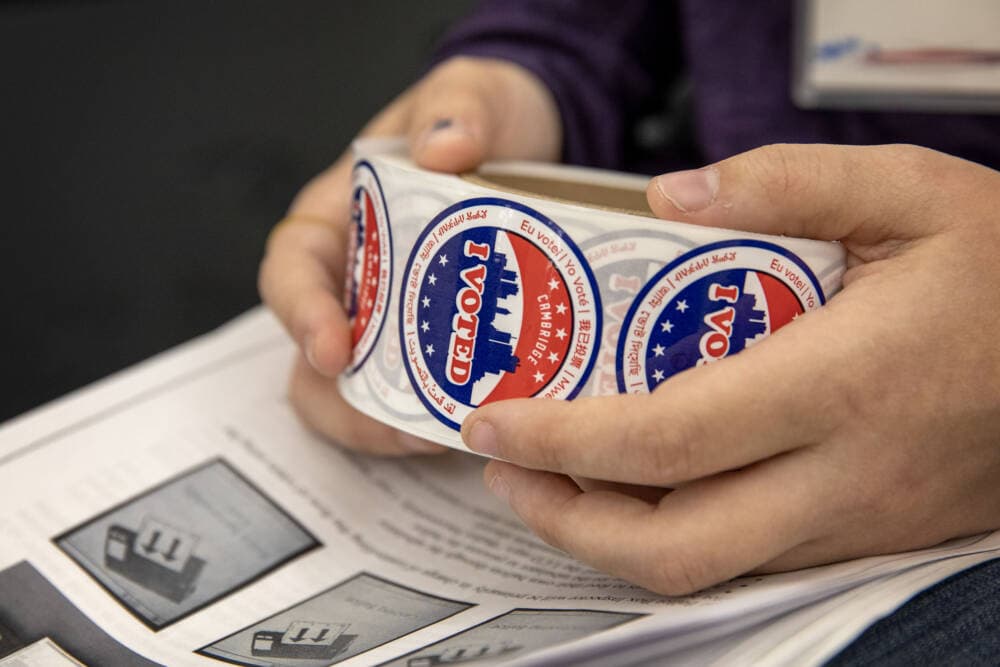Advertisement
Criminal justice advocates pursue voting rights for inmates with felony convictions in Mass.

Restoring the right to vote for those in Massachusetts prisons with a felony conviction would be the next step in criminal justice reform, advocates argued before the Election Laws Committee on Thursday.
"Imagine if you've registered to vote, voted in your first election — remember what that was like? And then that right was stripped away," Sen. Liz Miranda of Boston told the committee. "We know that the Legislature made great strides in voting rights last session, but as Black and brown people continue to be disenfranchised in state prisons and houses of corrections across the commonwealth, our work is really far from over."
Miranda and Rep. Erika Uyterhoeven of Somerville filed legislation (S 8 / H 26) that would lift the Constitution's ban on voting for people incarcerated on felony convictions.
The felony disenfranchisement constitutional amendment was added in 2000 when voters approved a statewide ballot question making it illegal to vote from prison while serving a felony sentence.
Advocates before the Election Laws Committee on Thursday argued that restoring that right would complete the work of criminal justice reform and voting right expansion bills that the state has passed over the last few years.
Uyterhoeven said revoking voting rights for those in prison is at odds with existing state laws.
"We state under our law, the duty of the commissioner of corrections is to prepare and assist each person who was incarcerated to assume the responsibility and exercise the right of citizens of the commonwealth. And what better way to be exercising your right as a citizen than to have the right to vote, engage with elected officials like us, and to be able to advocate for bills and issues that they care so deeply about," she said.
Advocates described the measure as a matter of racial justice because people of color represent about 18 percent of the population in Massachusetts, but 58 percent of people in the carceral system.
Though the Election Laws Committee's Thursday public hearing was open for comment on several bills, the committee only heard from those who were in favor of the constitutional amendment, and no one who opposes it, for about two hours.
Advertisement
Massachusetts resident Debra Skarpos said she served 28 years in prison, starting in the 1990s before the 2000 voting ban.
"You don't have much of a voice in there, and being able to vote made me feel part of the outside," she said. "And I believe that those who are incarcerated should have the right to vote, not only for themselves, but for their families and their loved ones."
Mallory Hanora of Families For Justice As Healing echoed Skarpos' comments, saying that those in prison deserve the chance to impact policy that will affect them and their families.
"Our communities do not stop at the prison gates. Incarcerated people — our parents, our grandparents need and deserve a say on who represents their children and grandchildren and shape the policies that affect our families," Hanora said. "Every legislative session, there are dozens and dozens of bills filed that affect incarcerated people and they should have a voice in who is making that policy decision."
Boston resident Stephen Pina said he was released from prison last year after spending 28 years in the system, attributing his release to the election of former Suffolk District Attorney Rachael Rollins, who is now U.S. Attorney for Massachusetts.
He said he learned more about politics from other inmates when he was in prison and, though he couldn't vote himself, encouraged his family members and friends to vote for Rollins, who ran on a progressive platform of criminal justice reform.
After Rollins was elected, Pina brought his case before her, claiming that he was wrongfully convicted. The district attorney helped uncover evidence that had been withheld from the defense during Pina's trial, The Boston Globe reported.
"Because of having my family vote for her, I was able to bring my case... and have my freedom back," he said.
Other advocates argued that politicians used to visit prisons more frequently when they knew those inside could vote.
Though no one testified in person against the constitutional amendment, the Massachusetts Fiscal Alliance put out a press release Thursday afternoon saying that "voters already rejected" this idea in 2000, when they passed the constitutional amendment by a vote of 64 to 36 percent.
"These totally misguided attempts to amend our state constitution proposed by a group of out of touch and fringe lawmakers should not even be considered," Paul Craney, a spokesman for the Massachusetts Fiscal Alliance, said in a statement. "Senator Liz Miranda and State Rep. Erica [sic] Uyterhoeven's amendments to overturn 23 years of precedent and overturn the overwhelming will of the voters is incredibly harmful to our elections and the victims of crimes. This is an opportunity for commonsense lawmakers to publicly draw a very clear distinction with the fringe of the legislature, who are out of step with ordinary Massachusetts people. There is no gray area with this idea, and these amendments should be immediately squashed by other mainstream lawmakers."
Massachusetts is not alone in reconsidering if inmates should be allowed to vote while serving time for felonies this year. Democratic lawmakers in California and New York have also filed bills and amendments to end felony disenfranchisement.